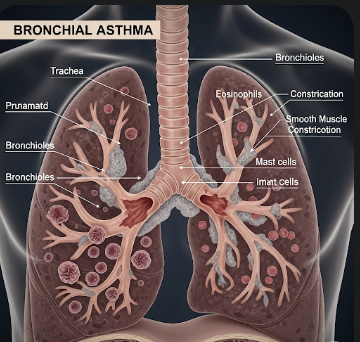Overview
Bronchial asthma is a chronic respiratory condition characterized by inflammation and narrowing of the airways, leading to recurrent episodes of wheezing, shortness of breath, chest tightness, and coughing. It is a common condition affecting both children and adults worldwide.
In Korea, asthma management focuses on early diagnosis, personalized treatment plans, and long-term monitoring. Korean hospitals and clinics provide advanced diagnostic tools, modern inhaler therapies, and patient education programs to help individuals control their symptoms and prevent exacerbations.
What is Bronchial Asthma?
Bronchial asthma is a chronic inflammatory disease of the bronchial tubes. The inflammation causes airway hyperresponsiveness, making the bronchi overreact to triggers such as allergens, irritants, or infections.
Key characteristics include:
- Airway inflammation leading to swelling and mucus production
- Bronchoconstriction, or tightening of the muscles around the airways
- Variable airflow obstruction, which can be reversible with treatment
- Chronicity, with recurrent episodes that can range from mild to severe
Asthma can be classified into several types:
- Allergic (extrinsic) asthma: Triggered by allergens such as pollen, dust mites, or pet dander
- Non-allergic (intrinsic) asthma: Triggered by infections, stress, or irritants like smoke or chemicals
- Exercise-induced asthma: Symptoms triggered by physical activity
- Occupational asthma: Caused by workplace exposures to fumes, dust, or chemicals
Symptoms
Symptoms of bronchial asthma vary in frequency and severity:
- Wheezing, especially during exhalation
- Shortness of breath
- Chest tightness or pressure
- Coughing, often worse at night or early morning
- Difficulty sleeping due to breathing problems
- Episodes triggered by allergens, cold air, exercise, or infections
- Fatigue due to poor sleep or exertion from breathing difficulties
Severe asthma attacks can result in respiratory distress and require immediate medical attention.
Causes
Bronchial asthma arises from a combination of genetic, environmental, and immunological factors:
- Genetic predisposition: Family history of asthma or allergies
- Allergens: Dust mites, pollen, mold, pet dander
- Respiratory infections: Viral infections in early childhood can trigger asthma
- Environmental irritants: Tobacco smoke, air pollution, chemical fumes
- Exercise and stress: Physical activity or emotional stress can provoke attacks
- Occupational exposures: Dust, chemicals, or fumes in the workplace
The underlying mechanism involves immune system overreaction, leading to inflammation, bronchoconstriction, and increased mucus production.
Risk Factors
- Family history of asthma, eczema, or allergic rhinitis
- Exposure to allergens or pollutants during childhood
- Obesity, which can worsen respiratory function
- Smoking or secondhand smoke exposure
- Frequent respiratory infections in infancy
- Occupational hazards such as exposure to irritants in certain industries
Complications
If asthma is not managed effectively, complications can arise:
- Frequent asthma attacks causing hospitalization
- Reduced lung function over time
- Respiratory infections such as pneumonia or bronchitis
- Chronic inflammation leading to airway remodeling
- Sleep disturbances and fatigue
- Severe asthma attacks can be life-threatening
Prevention
Preventing asthma exacerbations involves trigger management and lifestyle modifications:
- Avoiding known allergens and irritants
- Smoking cessation and avoiding secondhand smoke
- Maintaining a clean home environment with dust control
- Regular exercise with precautions for exercise-induced asthma
- Vaccinations to prevent respiratory infections
- Monitoring air quality and avoiding outdoor activity during high pollution periods
- Education on inhaler techniques and medication adherence
Treatment Options in Korea
Diagnosis
Accurate diagnosis is crucial for effective management:
- Medical history and symptom assessment
- Physical examination focusing on lung sounds and breathing patterns
- Pulmonary function tests (spirometry) to measure airflow obstruction
- Peak flow monitoring to track daily lung function
- Allergy testing for identifying triggers
- Chest X-rays or CT scans if complications or other conditions are suspected
Medical Management
Asthma treatment in Korea follows global guidelines (GINA) and personalized care:
- Inhaled corticosteroids (ICS): Reduce airway inflammation
- Short-acting bronchodilators (SABA): Quick relief during asthma attacks
- Long-acting bronchodilators (LABA): Used in combination with ICS for persistent asthma
- Leukotriene receptor antagonists: Oral medications to reduce inflammation
- Biologic therapies: For severe asthma, targeting specific immune pathways
- Oral corticosteroids: Short-term use during severe exacerbations
Lifestyle and Supportive Care
- Asthma action plans to monitor symptoms and manage flare-ups
- Breathing exercises and pulmonary rehabilitation
- Patient education programs in Korean hospitals for inhaler techniques and trigger avoidance
- Regular follow-up visits to adjust medication and monitor lung function
Prognosis
The prognosis for bronchial asthma is generally favorable with proper management:
- Most patients achieve good symptom control with medications and lifestyle adjustments
- Early intervention reduces risk of severe attacks and long-term lung damage
- Continuous monitoring and trigger avoidance improve quality of life
- Korean healthcare facilities provide comprehensive care, including modern medications, pulmonary rehabilitation, and patient education, ensuring effective long-term management
With advanced diagnostic tools, personalized treatment plans, and patient-centered care, Korea offers excellent management for bronchial asthma, helping individuals maintain normal daily activities, prevent complications, and improve overall respiratory health.













